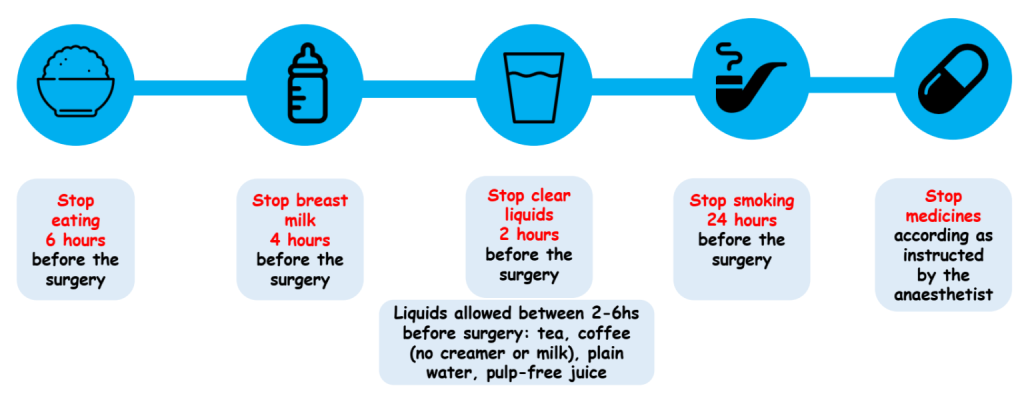
Patients often have many questions about anesthesia. Here are the most frequently asked questions:
1.What type of anesthesia will I receive?

This depends on the procedure, your medical history, and preferences. Options include general, regional, local anesthesia or sedation.
2. Are there risks associated with anesthesia?

Yes, but serious complications are rare. Common risks include nausea, sore throat, and allergic reactions. Your anesthesiologist will discuss your specific risks based on your health.
3. How will I feel after the anesthesia?

You may be drowsy for the first 30 minutes after the anesthesia wears off. Most people recover quickly, but it can vary. Patients only leave the recovery room if they are fully awake without any pain or particular discomfort.
4. How long will I be under anesthesia?
The duration depends on the procedure. Your anesthesiologist can provide an estimate based on the planned surgery.
5. Can I eat or drink before the surgery?

Typically, you’ll need to avoid food and drink for a specified time before surgery (usually 6-8 hours for food and 2h for clear liquids) to reduce the risk of complications.
6. What if I have allergies or medical conditions?

It’s crucial to inform your anesthesiologist about any allergies or medical conditions, as they can affect the anesthesia plan.
Do not hesitate to inform the anesthetist of all your allergies, including non-drug allergies. Indeed, there are cross allergies (example: kiwi allergy and latex allergy).
7. Who will be monitoring me during the procedure?

The anesthesiologist, along with a nurse anesthetist or anesthesiology assistant, will monitor you throughout the surgery.
8. What happens if I wake up during the surgery?

This is very rare. If it occurs, the anesthesiologist will ensure your comfort and manage the situation appropriately.
9. How long will I stay in the recovery room?

The length of time in the recovery room varies depending on the type of anesthesia, the type of surgery and the patient’s history:
- After sedation, patients stay in the recovery room at least 45 minutes.
- After general anesthesia, patients stay for at least an hour.
- After spinal anesthesia, patients stay until their legs are free to move again.
- After loco-regional anesthesia, the duration varies depending on the region blocked.
10. When will I be able to return to normal activities?

Now, anesthesia is very well tolerated. The limitation of activity will be more related to the type of surgery.
11. What should I do if I’m nervous about the anesthesia?
It’s normal to feel anxious. Talk to your anesthesiologist about your concerns; they can provide reassurance and information to help ease your mind.
By Dr Solène Paul – Anesthesiologist and Intensive Care physician

Your health is our mission
